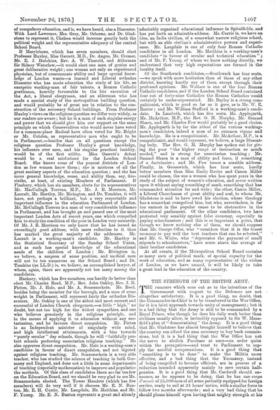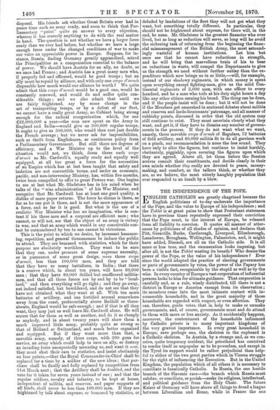THE STRENGTH OF THE BRITISH ARMY.
THE rumours which ooze out as to the intentions of the Government with respect to the Defences are not altogether satisfactory. It is a good thing, no doubt, that the Commander-in-Chief is to be transferred to the War Office, for it is a faint approach towards unity of management ; but it is a bad thing that the Army is still to be commanded by a Royal Prince, who though he does his daily work better than civilians usually allow, is invincibly opposed to Sir W. Mans- field's plan of " democratizing " the Army. It is a good thing that Mr. Gladstone has almost brought himself to believe that the country can afford the sum necessary to buy back commis- sions, but it is a bad thing that the War Office has not, the nerve to abolish Purchase at once—an order quite within the prerogative—and trust to Parliament to sup- ply the needful compensations. It is a good thing that "something is to be done" to make the Militia more effective, and a bad thing that the Yeomanry, instead. of being compelled to become efficient, are in process of a reduction intended apparently mainly to save certain half- pennies. It is a good thing that Mr. Cardwell should an- nounce, as he appears to be doing, that he has one corps d'arme'e of 35,000 men of all arms perfectly equipped for foreign service, ready to sail at 24 hours' notice, with a similar force to follow two months afterwards ; and a very bad thing that he should plume himself upon having that mighty strength at his disposal. His friends ask whether Great Britain ever had in peace time such an army ready, and seem to think that Par- liamentary "point" quite an answer to every objection, whereas it has scarcely anything to do with the real matter in hand. The question is, not whether we have it larger force ready than we ever had before, but whether we have a large enough force under the changed conditions of war to make our voice an appreciable power in Europe. Suppose, for in- stance, Russia, finding Germany greatly aggrandized, seized the Principalities as a compensation essential to the balance of power. We should have Austria for an ally, no doubt, as we once had France ; and Austria has a great many men who, if properly fed and officered, would be good troops ; but an ally must be repaid by alliance, and with only one corps d'arme'e disposable how much would our alliance be worth We quite admit that this corps d'arnze'e would be a good one, would be constantly renewed, and would do and suffer quite con- siderable things ; and we also admit that until we are fairly frightened, say by some change in the art of transporting troops, or by a defeat of our fleet, we cannot have a really great Army, no Cabinet being strong enough for the radical reorganization which, for our £22,000,000 a year—the sum now spent on the Army in England and India—would give us 300,000 regular troops, It ought to give us 500,000, who would then cost just double the French average ; but we never ask for impossibilities, such as thrift from Englishmen, or continuous policy from a Parliamentary Government. But still there are degrees of efficiency, and a War Minister up to the level of the situation would not, we think, deem three such corps d'arme'e as Mr. Cardwell's, equally ready and equally well equipped, at all too great a force for the necessities of an Empire which has at last been taught that safety and isolation are not convertible terms, and under an economic, pacific, and non-intervening Ministry, has, within five months, twice been compelled to offer to great Powers war. One begins to see at last what Mr. Gladstone has in his mind when he talks of the "wise administration" of his War Minister, and recognize that Mr. Cardwell has at least one good quality, a dislike of mere paper returns. The force he claims is there, as far as he can put it there, and is not the mere appearance of a force, and so far it is good. But what is the use of a realistic War Minister who has no imagination, who is con- tent if his three men and a corporal are efficient men ; who cannot, or will not, see that the object of an army is victory in war, and that an army which would in any conceivable con- test be outnumbered by ten to one cannot be victorious.
This is the point to which we desire, by incessant hammer- ing, repetition, and general tiresomeness to induce the public to attend. They are bemused with statistics, which for their purpose are absolutely worthless. They want to be sure that they can, under pressure of some supreme necessity, or in pursuance of some great design, move three corps d'arme'e, less than 100,000 men, and they are told that they have so many battalions, in India ; that there is a reserve which, in about ten years, will have 60,000 men ; that they have 80,000 drilled but unofficered militia- men, and that all these forces are by and by to be " local- ized," and then everything will go right ; and they go away, not indeed satisfied, but bewildered, and do not see that they have not obtained what they want at all. With ten more batteries of artillery, and one fortified arsenal somewhere away from the coast, preferentially above Redhill or there- abouts, England would be safe enough ; and if that is all they want, they may just as well leave Mr. Cardwell alone. He will secure that for them as well as another, and do it as cheaply as anybody, and in about twenty years will show them a much improved little army, probably quite as strong as that of Holland or Switzerland, and much better organized and equipped.. But if they want more than that, a movable army, namely, of three corps, with 300 guns for service, an army which could help to save an ally, or destroy an invading force unexpectedly menacing us, and want it now, they must shut their ears to statistics, and insist obstinately on four points,—that the Royal Commander-in-Chief shall be replaced for a time by a soldier of the new ideas ; that pur- chase shall be finally and fully replaced by competition from 31st March next ; that the Artillery shall be doubled, and the vote for it taken for seven years instead of one ; and that the regular soldiers, cavalry and infantry, to be kept at home, independent of militia, and reserves, and paper supports of all kinds, shall never be less than 100,000 men. If they are frightened by talk about expense, or bemused by statistics, or deluded by laudations of the fleet they will not get what they want, but something totally different. In particular, they should not be frightened about expense, for there will, in the end, be none. Mr. Gladstone is the greatest financier who ever lived, but as long as reduction will serve, so long will he avoid the sickening task of reforming from the beginning the finan- cial mismanagement of the British Army, the most astound- ingly wasteful of human institutions. Let him but once see that he cannot have reductions in strength, and he will bring that marvellous brain of his to bear on reductions in waste, will compel the Departments to give us the strength we need without further outlay than the ex- penditure which now brings us in so little,—will, for example, instead of our shadowy regiments, in which money is spent upon everything except fighting-men, give us the solid Con- tinental regiments of 3,000 men, with one officer to every hundred, and he a man who toils at his duty eight hours a day like any other citizen earning his bread. The thing can be done, and if the people insist will be done ; but it will not be done if the Members get enmeshed in scattered debates about militia and reserves and lords-lieutenants' patronage, and all manner of rubbishy points, discussed in order that the old system may still continue to exist. They must ascertain clearly what they want, and get it, if they have to dismiss any number of govern- ments in the process. If they do not want what we want, namely, three movable corps d'arzne'e of Regulars, 72 batteries of field artillery, and 80,000 militia fit to do all garrison work on a pinch, our recommendation is none the less sound. They have -only to alter the figures, but continue to insist harshly, obstinately, piggishly, upon securing the figures upon which they are agreed. Above all, let them before the Session arrives consult their constituents, and decide clearly in their own minds whether they really are devoted to peace, money- making, and comfort, as the talkers think, or whether they are, as we believe, the most utterly haughty population that ever responded to an insult by a blow.



































 Previous page
Previous page